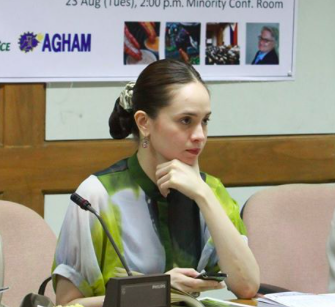Torres-Gomez: Fear of abuse of law not ‘valid reason’ to reject anti-terror bill
MANILA, Philippines — While admitting that the fear a law can be abused is not unfounded, it is not a “valid reason” to reject “needed legislation” such as the controversial anti-terrorism bill, Leyte Rep. Lucy Torres-Gomez said Wednesday.
In an interview with ABS-CBN News Channel’s (ANC) Headstart, Torres-Gomez defended anew the Anti-Terrorism Act of 2020, saying that theoretically, all laws can be abused. However, she said there are safeguards in place to prevent such abuse from happening.
“The fear that a bill can be abused, or the law can be abused is not unfounded. We have seen how laws have been abused in the years not just under the reign of President [Rodrigo] Duterte but even the reigns of other presidents,” Torres-Gomez said.
“But fear of abuse is not a valid reason to reject a bill outright. It is not a valid reason to reject needed legislation like the anti-terrorism bill because theoretically speaking, all laws can be abused, even social welfare laws that are very benign and charitable can be abused,” the lawmaker added.
In comparing the Anti-Terrorism Act of 2020 with the Human Security Act of 2007, Torres-Gomez said that a law on anti-terrorism should not just be reactive, but also preventive.
“In the Human Security Act, it was a dead letter law. We did not have a measure to prevent terrorism. It was all innocent until proven guilty. By that time, it does not apply to a crime like terrorism because if we use that argument, wala na, na-detonate na kung bomb,” Torres-Gomez said.
“Terrorism is the highest crime against humanity. I don’t think it is right to let go or to not pursue a tip or to not go after a suspect if he is suspected of the crime of terrorism because we have to weigh which risk weighs heavier on people, the risk of wrongful arrest or the risk of a terror attack actually happening,” she added.
Asked if she prefers wrongful arrest, Torres-Gomez said: “Not that I prefer. I’m just saying that if wrongful arrest just happens, that person has legal recourse, but when a terror attack has been carried out, the damage is irreversible.”
Torres-Gomez likewise defended the constitutionality of the measure, particularly Section 29 which allows the Anti-Terrorism Council (ATC) to authorize the arrest of a suspected terrorist as well as his or her detention for up to 14 days, and extendable by 10 more days.
The Leyte lawmaker explained that the ATC “is just issuing written authority to duly designate law enforcement deputies to determine probable cause if hot pursuit is in play.”
“The Anti-Terrorism Bill is not asking for judicial authority to be changed because it should remain with our courts. The principal author, Senator (Panfilo) Lacson has repeatedly said time and again that the Anti-Terrorism Council has no judicial or quasi-judicial powers,” Torres-Gomez said.
Section 29 of the bill, Torres-Gomez said, is “exactly the same” as Section 18 in the Human Security Act.
“But 13 years ago when it was written, nobody took it to mean that it was the (ATC) issuing the warrant of arrest,” Torres-Gomez, adding that the power to issue warrant of arrests remains with the courts.
Retired Supreme Court Senior Associate Justice Antonio Carpio, reacting to the legislative measure, earlier said that “only a judge can issue warrants of arrest,” with a warning that if the anti-terror bill becomes law, the country will be in a situation “worse than martial law.”
The controversial measure only needs the signature of Duterte become a law. The Presidet could either sign the bill into law or veto it. He could also let the measure lapse into law after 30 days of receipt without signing it.
Malacañang has earlier said that Duterte “is inclined” to sign the measure.
